Staff
Manuel Anderson
Research Assistant - Ecologist

Manuel studied political science at the University of Chicago and worked as a paralegal and as a teaching assistant abroad before rediscovering a deep connection to plants. Many outdoor volunteer experiences and participating in the Michigan Conservation Stewardship Program led him to work as a field research technician in southeast Michigan and as an environmental educator in Paraguay before earning an MS in applied ecology at Michigan Technological University. His research experiences include vegetation surveys to assess the impacts of chronic deer browse and of introduced earthworms on understory plant communities, forest health monitoring and inventory, and qualitative surveys and interviews. During graduate school, Manuel also had auspicious opportunities to support field research campaigns in Costa Rica and Isle Royale National Park in addition to field work conducted throughout the western Upper Peninsula for his thesis. Manuel loves gardening, visiting new parks and preserves with his dog Osa, and is diving into learning more about birds and herps.
Peter J. Badra
Conservation Scientist - Aquatic Zoologist

Pete’s professional interests revolve around aquatic animals and ecosystems. An early MNFI director introduced him to freshwater mussels and conservation challenges facing these species. Since joining MNFI he has led the effort to assess the status and distribution of native unionid mussels in Michigan through field surveys and collaborative research projects. His work also includes gastropods (aquatic and land snails), macroinvertebrates, and fish in rivers, inland lakes, vernal pools, and the Great Lakes. He provides expertise and training to professionals, governmental agencies, NGOs, and students. Snorkeling and birding with his family as a child sparked his appreciation for the natural world, especially aquatic life. He earned a BA in Biology from Earlham College and a MS in Environmental Science from Ohio University. Some of his most enjoyable and rewarding days are spent leading field trips and workshops on mussel ecology, conservation, and identification. His free time revolves around his young family and water as well, with windsurfing, swimming, and cross-country skiing.
Tyler Bassett
Conservation Associate - Botanist

Tyler studies the ecology of natural communities and the rare plant species they support. Through a growing understanding of how they function, where they occur, why they occur there, and why they are important, his work informs the conservation and restoration of key elements of biodiversity in Michigan and beyond. He advances these goals in four primary ways: 1) by documenting and monitoring rare plant species populations through focused surveys and coordinating with partners that contribute data; 2) by utilizing data collected by MNFI scientists and from the published literature to better understand the ecology of and predict the distribution of rare species; 3) by mapping plant community composition and structure onto environmental variation in natural communities, to aid in the classification and management of those communities, and 4) through collaborations with a diversity of public and private researchers and land managers that help to understand and enact conservation efforts. His career as a botanist, ecologist, restoration practitioner, and land manager spans 20 years. With MNFI since 2018, he carries forward a broad knowledge of ecology and restoration, and in particular a passion for understanding and restoring the fragmented prairie-savanna landscapes of the upper Midwest. He holds a B.S. in Biology from Western Michigan University, and a PhD in Plant Biology, and Ecology, Evolutionary Biology, and Behavior from Michigan State University.
Eric Branch
Research Assistant - Zoologist

Eric joined MNFI in 2023 after working with them as a seasonal field technician in 2022. He received his BS from Western Michigan University, during which time he developed an appreciation for field work, applied science, and avian research. After graduating, Eric spent time in the Pacific Northwest, where he conducted surveys for at-risk bird species and monitored flying squirrel populations. Upon returning to Michigan, he assisted with research focusing on how human-generated noise influences songbird communication, behavior, and fitness. At MNFI, Eric supports the work of the science staff by conducting targeted surveys for rare and declining species, with a focus on songbirds and raptors. He enjoys contributing to long-term monitoring studies and helping to assess how species respond to habitat management. In his free time, he enjoys birding with his partner, running, hiking with his dog, and playing sports.
Michelle Busch
Conservation Associate - Aquatic Zoologist
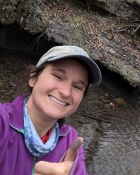
Michelle’s research interests largely focus on human impacts on aquatic communities and ecosystems. Her passion and interest in the outdoors began at the University of Michigan Biological Station, where she first began to study the diversity of freshwater ecosystems and their organisms. After graduating from the University of Michigan, Michelle dove deeper into community ecology and dune restoration when she moved to Houston, Texas to be a lab manager. She then got her PhD at the University of Oklahoma where she focused on the impacts of climate change and fragmentation (through drying and dams) on rivers and streams. After defending, Michelle became a postdoctoral researcher and data manager, focusing on the links between hydrology, biogeochemistry, and community ecology to better understand non-perennial river ecosystems. She is excited to return to Michigan where her love of ecology began to further explore aquatic ecosystems and conserve insects, fish, mussels, and gastropods across the state. Michelle enjoys spending time outdoors with bikes, water shoes, or hiking boots and trying out new recipes in the kitchen.
Sarah Carter
Office Assistant

Sarah supports the MNFI team by assisting with general office duties, payroll processing, and effort reporting calculations. She fulfills book orders placed online and via phone and email inquiries, and processes accounts payable and accounts receivable payments. Sarah utilizes the University’s travel system to process travel reimbursements for all MNFI team members. She earned a BA from Michigan State University in Communications. Sarah comes from a construction background and has thrived in the MNFI culture. As she learns and grows within MSU Extension and MNFI, she is inspired by the work being done by the group throughout the state. Sarah enjoys working out and taking weekend trips to Pentwater and the Upper Peninsula with her family.
Joshua G. Cohen
Senior Conservation Scientist - Ecologist

Josh’s primary duties at MNFI involve refining and revising the natural community classification through ecological inventory and sampling, literature research, and data analysis. He is responsible for classifying conservation targets and prioritizing areas for conservation and restoration; creating and delivering biodiversity and ecosystem management trainings; and designing and conducting vegetative sampling, ecological mapping and modeling, monitoring, and surveys for natural communities. Cohen is the lead author of A Field Guide to the Natural Communities of Michigan and a recent article in Diversity entitled “Assessing the Ecological Need for Prescribed Fire in Michigan Using GIS-Based Multicriteria Decision Analysis: Igniting Fire Gaps”. Growing up on California’s Monterey Peninsula, he spent hours exploring its rich native ecosystems, learning about them, and catching snakes and lizards. He earned a BA from Amherst College and a Master’s of Environmental Management at the Duke University Nicholas School of the Environment. He is inspired by the words of Baba Dioum “In the end we will conserve only what we love, we will love only what we understand, and we will understand only what we are taught." He enjoys time with his family and stays in “ecologist shape” with nature photography, biking, cross-country skiing, and playing many sports with his kids.
Ashley Cole-Wick
Conservation Associate - Zoologist

Ashley joined MNFI in 2018 after spending the last 6 years working as a biologist in Kalamazoo, MI where she led projects on imperiled Lepidopteran species, fire effects, and climate change. A native Iowan, she received her undergraduate degree in Environmental Science and Policy at Drake University, where she gained life-long mentors and eco-friends, as well as an introduction to fieldwork and prescribed fire. Ashley relocated to Michigan after spending several years abroad working with children in South Korea, environmental non-profits in the Peruvian Amazon, and then completing a Master's in Conservation Biology at the University of Alberta in 2013. In Michigan, she has worked extensively with many imperiled butterfly species, including the federally endangered Mitchell's satyr butterfly, for which she established a captive propagation program and facility. The conservation of rare habitats is what motivates Ashley's career in the natural sciences. She is an active member of the Lepidopterists' Society, fluent in climate change interpretation, and earnestly enjoys helping people better understand the natural world around them. Ashley lives in Kalamazoo where she enjoys volunteering, drinking coffee with her book club, and spending time with her husband, two dogs, and backyard chickens.
David L. Cuthrell
Senior Conservation Scientist - Zoologist

Dave conducts targeted rare species surveys and environmental reviews. His applied research and monitoring studies assist in conservation decision-making and implementation of the Michigan Wildlife Action Plan. He is deeply involved in a project to determine the statewide distribution and conservation status of Michigan’s bumble bees. He continues to study the status of insects, particularly butterflies and moths, as well as hawks and owls. In fact, he has probably seen more raptor nests than anyone in the state of Michigan. Believing that “conservation requires knowledge and action,” he disseminates information to the regional and local U.S. Fish and Wildlife Service and through publications, training workshops, and participation in many professional organizations. Growing up on an Iowa farm, his passion for the natural environment evolved into a fascination with entomology and animal ecology. He received his BA in Biology at the University of Northern Iowa and an MS in Entomology at North Dakota State University. When he is not chasing bugs or sloshing through prairie fens, he enjoys time with his family and umpiring baseball.
Dan Earl
Research Assistant - Zoologist

Dan works as a Zoology Research Assistant where he works to support science staff on a wide range of projects conserving Michigan’s wildlife. Dan earned his BS from Central Michigan University and his MS from Purdue University Fort Wayne. Ever since leaving undergrad he found a passion working with rare wildlife in Michigan, largely through serving two yearlong terms with MNFI as a Huron Pines AmeriCorps member. Afterwards, he stayed on with MNFI seasonally working with rare turtle research in Michigan as part of his master’s research until joining MNFI full time in 2022. He continues to work to use and improve his knowledge about rare wildlife and heritage methodology to assist in conservation for rare species in Michigan with a focus on herpetofauna and insects. In his free time, he can be found travelling across the state to new areas, playing board games with friends, or learning how to paint.
Alex Ellison
Research Assistant I - Botanist
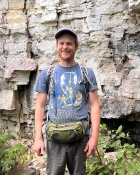
Alex’s primary role at MNFI is conducting rare plant surveys for different projects across Michigan to help science staff and MNFI partners conserve and protect rare plants and natural communities. This includes field season surveys, data collection and entry, mapping and report writing. Alex earned his Bachelor of Science in biology from Grand Valley State University (GVSU) in 2016 with a focus on plant biology and taxonomy. While at GVSU Alex worked as an intern for Michigan Nature Association where he learned valuable plant and natural community identification skills and gained experience in habitat restoration on the barrens and prairies of Newaygo County. After earning his degree at GVSU he worked as an over-the-road flatbed truck driver for 3 years. While over-the-road, botany and ecology never left his mind; in the evenings after driving, he taught himself how to key grasses he collected at truck stops and rest areas across the country. In 2021, he began working as a seasonal botanist at MNFI and after 3 field seasons he was hired as a Research Assistant I – botanist. In his free time, Alex likes to spend time with friends and family and his cat, play music and write songs, travel and explore Michigan and other botanically and geologically interesting places and ride his bike and skateboards.
Helen D. Enander
GIS Analyst
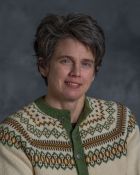
In her work at MNFI since 2000, Helen designs and implements geospatial projects involving mapping, web services, spatial analysis, special distribution modeling, enterprise GIS management, and spatial statistics. She enjoys computers, technology, and problem solving. She also provides technology assistance to staff working in the field. At one time a full-time dairy farmer in South Dakota, she describes her work ethic as a “task-oriented Midwestern farm girl.” She earned her BA in Biology at Augustana College in Sioux Falls. Working as a GIS technician at a forest resources firm in Kentucky, she was inspired her to pursue her MS in Geography at Murray State University. Her thirst for knowledge also led her to study geography at the doctorate level at Michigan State University. As well as enjoying time with her family, she is active as an animal rescue volunteer for several local organizations.
Rachel Hackett
Conservation Associate - Botanist

Rachel uses her botanical skills to delineate and classify natural communities, document species habitat, combat invasive wetland plant species, and study plants of conservation or cultural interest. She also enjoys conducting science education, especially student-led inquiry. She loved playing outdoors as a child, but in 6th grade she learned of efforts to preserve tropical rainforests, specifically the Children’s Eternal Rainforest (Bosque Eterno de los Niños), and grew passionate about the environment and conservation. She earned her BS in Environmental Science at Aquinas College in Grand Rapids, Michigan. After seven years of working in informal science education in Michigan, Costa Rica, and the Pacific Northwest, she returned to school to earn her MS and PhD from Central Michigan University in Mount Pleasant, Michigan. Her studies focused on understanding drivers of plant diversity in Michigan's prairie fen wetlands and utilizing technologies like remote sensing in ecological studies. The AmeriCorps motto of "Get[ing] things done" stuck with her after her service terms, and she devotes her free time to volunteering, hiking, bicycling, baking, board games, trivia, and crafts.
Kraig M. Korroch
Information Technologist

Kraig administers and manages many aspects of the complex IT needs of the organization, including the servers, database server, website, administrative functions, rare species reviews, biotics data, and delivery of data to clients and requestors. Interested in all the sciences as a youth, Kraig started programming with Fortran as a teenager and has remained intrigued by the dramatic evolution of the IT ever since. At Michigan State University, his focus turned to nature and biology, where he earned his BS in Environmental Science. Working at MNFI since 1997, he has combined his interests in biology, the environment, technology, and computers.
Aaron Kortenhoven
Conservation Scientist - Ecologist

Since joining MNFI, Aaron’s work focuses on ecological assessment of natural communities throughout Michigan, in addition to ornithological surveys and research. He grew up in northern in Sierra Leone, where his backyard bordered a forest that was his doorway to the natural world which eventually him to pursue a degree in natural resources. After earning a BS in Fisheries and Wildlife at Michigan State University, he returned to Sierra Leone to work in war relief efforts shortly after which he went to Nigeria to facilitate the efforts of the Wildlife Conservation Society/Fauna and Flora International Cross River Gorilla project in Nigeria. He returned to the US to earn his MS in Tropical Ecology at the University of Miami, conducting research in Sierra Leone that helped establish the Loma Mountains National Park. Outside of work he spends much of his time enjoying nature with his family and building acoustic guitars.
Yu Man Lee
Conservation Scientist - Herpetologist

Yu Man has conducted inventories, research, and monitoring to assess Michigan’s rare and declining animal species, particularly amphibians and reptiles, and their conservation needs since joining MNFI in 1997. Other focus areas include vernal pool mapping and monitoring, climate change vulnerability assessment, conservation planning, education and outreach, and community science. Growing up in New York City, she was inspired by Jacques Cousteau TV specials to become a marine biologist, only to learn she gets terribly seasick. Changing to wildlife biology, she pursued a BS in Natural Resource Management at the University of Michigan and her MS in Wildlife Science from Oregon State University. Her motto, “See a need, fill a need,” is reflected in her work with public and private partners to increase knowledge about vernal pool status, ecology, and impact on forest health, which received a Community Partnership Award from MSU Extension’s Community and Natural Resources Development Association. When not handling venomous snakes or looking for fairy shrimp, she sits on many committees and enjoys trying new recipes and spending time with family, friends, and her two dogs, Blizzy and Scooby.
Jesse Lincoln
Conservation Scientist - Plant Ecologist

Jesse studied at Grand Rapids Community College and completed his BS and MS in Plant Biology at Grand Valley State University where he studied plant interactions. He began his career at MNFI in 2010 as a seasonal employee conducting vegetation mapping on State Game Areas and was hired as a Conservation Associate in 2013 and has enjoyed working for the organization as a plant ecologist ever since. His professional interests are driven by a passion for identifying and stewarding Michigan’s natural communities and then communicating their value to a range of audiences. Specializing in fire-dependent ecosystems, he focuses on the processes that support their recovery and stability. He has recently worked with other MNFI Scientists to use models to identify previously undocumented natural communities. This innovative approach has not only broadened our understanding of these ecosystems but has also provided an effective approach for identifying conservation priorities across the state. Jesse’s work is grounded in the belief that the best way to protect our native biodiversity is to identify and protect the best examples of our rare natural communities and manage them in a way that prevents rare species from becoming extinct and common species from becoming rare. These are fantastically complex systems and we are unable to completely understand them. Jesse strives to always learn and to collaborate closely with land managers to implement careful strategies that ensure the resilience of these vital habitats. His philosophy is that to be a good ecologist one must be unreasonably optimistic. There are many threats to the things we care about but important places do get protected and cared for. He is inspired by the complexity, beauty, and resilience of the natural world. Through his work, he aims to make meaningful contributions to the conservation of our natural heritage: safeguarding our plants, animals, and special places for future generations.
Michael J. Monfils
Director and Wildlife Ecologist

Mike develops wildlife research, monitoring, and surveillance projects designed to inform conservation decisions, such as ecosystem management and restoration, and endangered species recovery. He brings substantial field experience combined with an understanding of study design requirements and analytical techniques to the development of projects that address real world conservation questions within the confines of limited funding and logistical constraints. Most of his background and experience has been with birds – waterfowl, waterbirds, shorebirds, diurnal raptors, owls, nightjars, and songbirds. He has been deeply involved with the development of a marsh bird research and monitoring program in collaboration with conservationists from across the Midwest. Growing up hunting, fishing, camping, and skiing in northern Michigan instilled a love of the outdoors. He went on to pursue a BS in Biology at Grand Valley State University, and his MS and PhD in Fisheries and Wildlife from Michigan State University. In addition to spending recreation time with his family, he is also an avid hunter, fisherman, and birder.
Mary R. Parr
Conservation Associate - Fire Ecologist

Mary joined MNFI in 2025 as a Conservation Associate, bringing with her expertise in fire-dependent natural communities and the strategic use of prescribed fire to enhance biodiversity and support critical habitat for fire-adapted rare and endangered species. Raised in southwest Michigan, Mary developed an early passion for plants and the ecology of natural systems. She earned her BS in Natural Resource Management from Grand Valley State University (GVSU) and spent her early career in the Great Plains and Midwest, where she honed her knowledge in large-scale prescribed fire, grassland management, and long-term ecological monitoring. In 2020, she returned to southwest Michigan as a land manager at a biological field station, where she spent four years overseeing conservation projects, leading prescribed fire operations, mentoring undergraduate students, and advancing the protection of rare and endangered species. During this time, she also earned an MS in Biology from GVSU, studying the impact of prescribed fire seasonality on plant composition in restored tallgrass prairies. Mary is a passionate educator, frequently delivering presentations on the intricacies of fire-dependent ecosystems and promoting the relevance of Indigenous Knowledge in natural resource management. She is a proud member of the Sault Ste. Marie Tribe of Chippewa Indians (Ojibwa) and an active participant in the Michigan Prescribed Fire Council.
Debra Richardson
Administrative Assistant - Pre-Award Support

Deb has worked in research administration since 1991 and has been with MSU Extension since fall of 2019. Graduating from MSU in 1999, she passed her research administration exam in 2010. She truly enjoys working with MNFI and hopes that it continues for years to come.
Rebecca L. Rogers
Associate Director
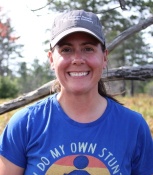
Becca works with the wide range of public, private and nonprofit organizations as well as individuals seeking to connect with Michigan's Natural Heritage Database. At MNFI since 1999, she enjoys helping interpret the data and promoting the organization. As the GIS/IT Manager, she supports and participates in the scientists' research, and coordinates closely with all staff to continuously build and maintain the most current information within the database. She has always been drawn to spatial data and geography. At Michigan State University she pursued her BS in Resource Development, Environmental Studies and Applications as well as an MS in Geographic Information Science. She shares her expertise as a trainer for Heritage Database users, she is a GIS adjunct faculty member, and a trainer for MSUE's Leadership and Community Engagement team. She also enjoys biking, camping, and spending time with family and friends.
Courtney Ross
Research Assistant - GIS Specialist
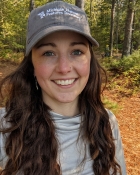
Courtney combines her technical skills and creativity to develop survey applications for collecting data and engaging solutions to share MNFI research with partners and the public. She enhances Michigan's Natural Heritage Database by streamlining data entry, assisting with staff/user training, and ensuring data quality. She’ll also gladly throw on her field hat from time-to-time to assist with surveys. Her passion for environmental work grew during her first internship in the Boundary Waters Canoe Area Wilderness. She spent a few field seasons out West on backcountry trails and wildlife survey crews before moving back to the Great Lakes. She is currently pursuing her MS in Geography at Michigan State University and holds a BS in Biology from University of Wisconsin – Stevens Point. In 2021, she completed her Professional GIS Certificate through the onGEO Program at Michigan State University. She enjoys traveling, camping, and whipping up new recipes in the kitchen.
Logan Rowe
Conservation Associate - Zoologist

Logan joined MNFI in 2018 as a Conservation Associate and works primarily with rare and declining insects in Michigan. He received his BS from Western Michigan University (2012), his MS from Michigan State University (2017), and has spent the past 8 years committed to the conservation of imperiled insects and their associated habitats. His previous work includes habitat monitoring, host-plant use, and conservation of Karner blue and Monarch butterflies, effects of climate change and precipitation extremes on populations of fireflies, and the response of plant/pollinator communities to habitat restoration implementation and management. At MNFI, Logan is involved in projects that assess the current and future distributions of bumble bees, response of bumble bees to habitat management, and targeted survey efforts for bees, butterflies, moths, and other imperiled insect species. Logan is also highly active in the extension of conservation science and will regularly present at local, state, and national meetings.
Michael A. Sanders
Research Assistant - Environmental Review Specialist and Zoologist

Mike reviews development projects to determine potential impacts to protected species. He earned a BS in Biology at the University of Tennessee at Martin, his MA in Environmental Geography at Western Michigan University, and his MS in Wildlife Biology at Tennessee Tech University. Educational field trips out west during college and work as a seasonal park ranger inspired him to pursue environmental work. Previous work as a regional planner in Tennessee taught him the importance of project management and teamwork, knowledge he now uses in MNFI’s environmental compliance services. Working at MNFI since 2003, his first years in the organization involved a 5-year wetland bird survey that took him to all corners of Michigan. He recently retired from the US Coast Guard Reserve as a Senior Chief Petty Officer and specialized in incident response, including deployments for floods, hurricanes, and the Deepwater Horizon oil spill. He enjoys spending time with his family, fishing, hiking, and camping, travel and raising poultry. His current goal is to visit every state in the union and every National Park site.
Nicolette Sexton
Environmental Review Analyst and Zoologist
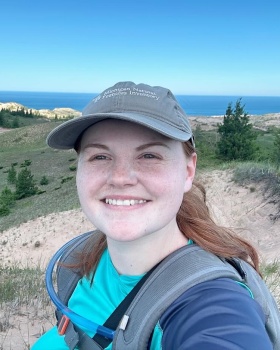
Nicolette joined MNFI as an Environmental Review Analyst in 2024 after serving as a Huron Pines AmeriCorps member for two years. She received her BS in Zoology from Northern Michigan University, during which she developed an appreciation for Michigan’s Upper Peninsula, field work, databases, small mammals, and parasites (especially ticks). She then received her MS in Biological Sciences from Western Michigan University where she studied bats and their parasites. While at WMU, she assisted in various other projects including bat White-Nose Syndrome research in the abandoned mines of the Upper Peninsula and the active management of invasive crayfish in southwest Michigan. At MNFI, Nicolette reviews development projects to determine potential impacts to protected species and conducts surveys for rare, threatened, and endangered animals. She has a passion for bat conservation and has extended this to MNFI by creating the community science Michigan Bat Roost Monitoring Program in 2024. She also enjoys camping, hiking with her dogs, drawing, and traveling around the U.P.
Danielle Smith
Research Assistant - Botanist
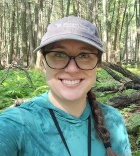
Danielle joined MNFI as a Botany Research Assistant in 2022, and her primary role is to perform rare plant surveys. She received her BS in Biology with an Emphasis in Plants and a Minor in Natural Resources Management from Grand Valley State University in 2013. Her time at GVSU unlocked a fervor and passion for plants, ecology, and restoration that she carried through to a career in environmental consulting where she implemented restoration designs, monitored restored sites, and conducted vegetation surveys. She is eager to utilize and expand her botanical knowledge at MNFI, and she is thrilled to be so directly involved with the conservation and preservation of Michigan’s rare species. Outside of work, her interests include hiking, trivia, board games with friends, and metalsmithing.
Nicole Smith
GIS Analyst

Nicole joined MNFI in 2022 as a GIS analyst. She supports research and conservation work in the form of spatial modeling and analysis, cartography, automating GIS workflows, integrating spatial data, and assisting GIS software users. She received her BS in Plant Biology at University of Michigan and her MS in Geography from Michigan State University. In the past, she has worked in the lab and field assisting studies of the invasive Emerald Ash Borer beetle, modeling the locations of mosquito habitat in a malarial setting, and building the geospatial components of an integrated national lake water quality database. Nicole grew up in Michigan and is a member of Bay Mills Indian Community (Ojibwe).
Abraham Stone
Research Assistant - Botanist

Having been born and raised in rural northern lower Michigan, Abraham developed an early love of northern forests that has guided him throughout his adulthood and career. Before joining MNFI as a botanist, Abe worked as a research assistant at Michigan Technological University, where he participated in, wrote, and led a series of ecological projects that included invasive species biology, fungal biocontrol evaluations, and community dynamics on glade systems. His most recent adventure took him to volcanic bedrock lakeshores, where he studied how bedrock composition interacts with lake, wind, and bordering forest to produce unique and endangered arctic communities. With field seasons mostly on Isle Royale and the Keweenaw Peninsula, Abraham developed specializations in boreal, disjunct, and lithophilic flora, but is looking forward to expanding his experience to below the 45th parallel! His non-plant professional interests include geology, fungi, and lichens. He enjoys long-distance hiking, mushroom hunting, and rock-hounding, and loves pulling passion out of people for our region’s remarkable natural systems.
Scott Warner
Conservation Associate - Botanist

Scott developed a love for botany while working at a campground as a teenager alongside an amateur botanist. He received his BS in Biology from Western Michigan University. At Michigan State University, he received his PhD in Plant Biology with a focus on dendrochronology—the study of tree rings. He has published papers on the reconstruction of paleoclimate and on forest productivity under ongoing climate change. Throughout graduate school, he continued to nurture his passion for field botany and a dream of working at MNFI. Scott enjoys finding previously unknown examples of rare plants and quality natural communities. An avid collector, he always watches for new county records and contributes specimens to three Michigan herbaria. He is a member of the Huron Valley Chapter of the Michigan Botanical Club and an associate at the Michigan State University Herbarium. Scott has hiked around much of eastern North America, including the entire Appalachian Trail.
Clay Wilton
Conservation Associate - Ecologist

Clay’s work focuses on the estimation of animal population abundance and occupancy, particularly how landscape metrics shape animal distribution. He also classifies land cover using GIS and field inventories to document Michigan’s high-quality natural communities and rare species. He has had a lifelong interest in nature and science, so it was a natural progression from exploring forests and streams as a child to becoming an ecologist. He received his B.S. in Natural Resources at Central Michigan University and M.S. in Wildlife Ecology at Mississippi State University where his thesis assessed the distribution and abundance of black bears in Missouri using genetic spatial capture-recapture methods. He is currently a Ph.D. student in the Michigan Cooperative Fish and Wildlife Research Unit at Michigan State University, where his research focuses on plant and animal community responses to prescribed fire and mechanical treatments in upland oak ecosystems in southern Michigan. He enjoys nature photography, gardening with native plants, and exploring the outdoors with his two children.
Connor Wojtowicz
Conservation Associate - Botanist

Connor focuses on collecting data pertaining to rare plant species and high-quality vegetative communities, using these data to identify conservation needs of species and habitats as well as inform land management decisions. He was born and raised in Grand Rapids, Michigan, where summers spent outdoors in Mason County guided him to an undergraduate degree in Natural Resources Management from Grand Valley State University. He spent six years as an environmental consultant in Michigan before obtaining his M.S. in Conservation Biology at Antioch University New England. While much of his work has focused on plants of the Great Lakes Region, he has also lived and worked as an ecologist in San Francisco, CA; Keene, NH; Fort Collins, CO; and Estes Park, CO. Outside of ecology, Connor enjoys hiking, fantasy literature, playing stringed instruments, and delving into the mystical realms of role-playing games.

